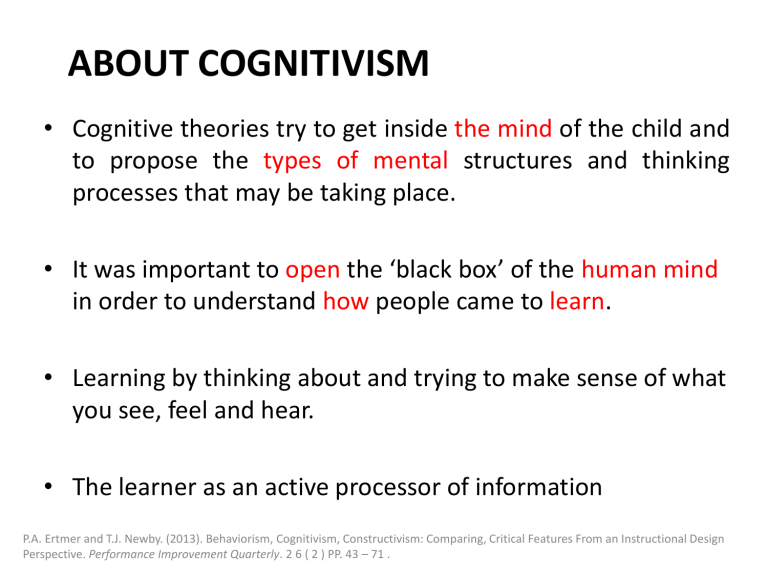cognitivism~
advertisement

ABOUT COGNITIVISM • Cognitive theories try to get inside the mind of the child and to propose the types of mental structures and thinking processes that may be taking place. • It was important to open the ‘black box’ of the human mind in order to understand how people came to learn. • Learning by thinking about and trying to make sense of what you see, feel and hear. • The learner as an active processor of information P.A. Ertmer and T.J. Newby. (2013). Behaviorism, Cognitivism, Constructivism: Comparing, Critical Features From an Instructional Design Perspective. Performance Improvement Quarterly. 2 6 ( 2 ) PP. 43 – 71 . JEAN PIAGET • Schema building block of knowledge • Assimilation use current schemes to interpret the external world (equilibrium) • Accommodation adjust old schemes to better fit environtment (disequilibrium) 4 Stages of Cognitive Development Piagetian View of Cognitive and Language Development Vygotskyan View of Cognitive and Language Development Interaction with the world and with others Cognitive development (thought) Language Changing Relationship between Cognitive Development and Language Bloom’s Taxonomy Implication for teaching Use verbs aligned to the taxonomy to plan lessons that would that learners’ cognitive skills from LOTS to HOTS Attention should be given to: • The need to organize and structure meaningful learning activities. • The requirements of the task must be appropriate to the developmental stage (Piaget, Bruner) and allow for the development of HOTS (Bloom) PRINCIPLES • Children will provide different explanations of reality at different stage of cognitive develoment. • Learning material and activities should involve the appropriate level of motor or mental operation for a child; avoid asking students to performs tasks that are beyond their level cognitive capabilities. • Use teaching methods which actively involve students and present challenges. Basic teaching techniques associated with a cognitive theory of language learning • • • • Problem based learning (problem solving), Discovery learning, Cognitive strategies, Project based learning, etc Suharno. Cognitivism and Its Implication Inteaching Second Language Learning. Parole. Vol. 1 Oktober 2010


